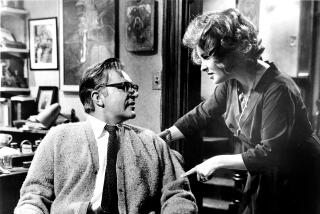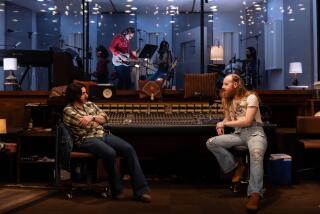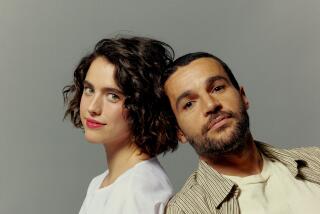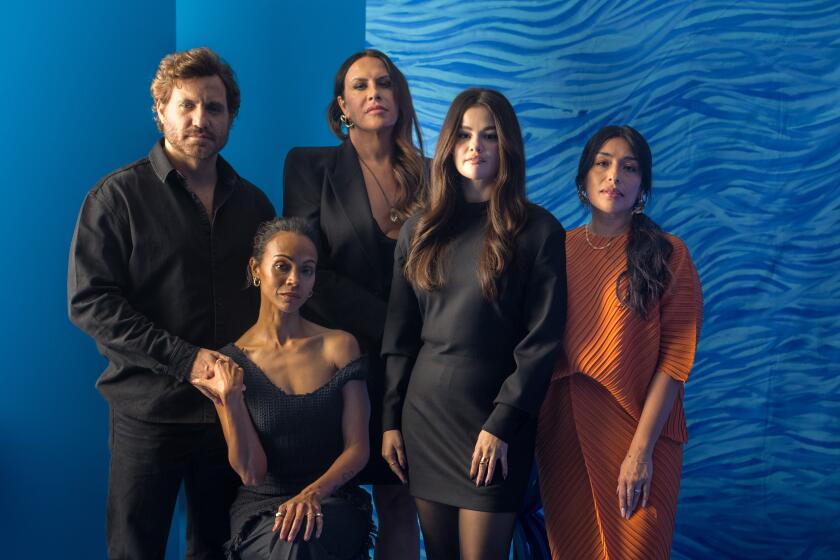Review: ‘The World to Come,’ a period romance constrained by wordiness
The Times is committed to reviewing theatrical film releases during the COVID-19 pandemic. Because moviegoing carries risks during this time, we remind readers to follow health and safety guidelines as outlined by the Centers for Disease Control and Prevention and local health officials.
Historical drama “The World to Come” has so much going for it — atmosphere, locations, situational tensions and performances — that its lingering diffuseness is puzzling, like a promised but undelivered rain for a well-laid seedbed.
The weight of seasons is a time marker of sorts for this 19th-century lesbian romance between neighboring pioneer wives played by Katherine Waterston and Vanessa Kirby, and in director Mona Fastvold’s stark, attentive movie, the interior weather is as fully expressed as the exterior kind. But in adapting short story maestro Jim Shepard’s tale of intense attraction bred in unforgiving isolation, the movie mistakes wordiness for worthiness and telling for showing.
Our window into this world as the icy new year of 1856 begins is through the highly literate, narrated thoughts of Waterston’s Abigail, an upstate New York farm wife who with her husband Dyer (Casey Affleck) is looking for a road back to meaningfulness after the recent death of their only daughter. She tracks her feelings and observations in a diary she views as an honest, from-the-heart corrective (“I have become my grief”) to the numbers-driven farm ledger her morose, duty-minded spouse keeps.
In the absence of any marital reconnection beyond what is for her increasingly constrictive housewifery, Abigail finds healing friendship in vivacious new neighbor Tallie (Kirby), an outspoken thinker whose regular visits change the molecules in the air. For Tallie, the liberation in their bond is an escape from the controlling atmosphere generated by her stern husband Finney (Christopher Abbott), who wonders why she hasn’t produced a child yet. The women, meanwhile, understand that something new and breathtakingly alive is being created by their time together — the question is whether it can be nurtured in a setting practically choked by convention and burden.
Same-sex romances from long ago are nearly always defined by the fizz in what’s forbidden, and the setting here — rustic but constrained, with hilly, rugged expanses, anchored by Jean-Vincent Puzos’ transportive log-cabin production design — is no less powerful for the anticipation it creates for the unleashing of passion. But “The World to Come” suffers frombaked-in obligation, to the written word as both a literary adaptation (Shepard co-scripted with Ron Hansen) and diary-driven story dependent on narration. The result is a movie that can seem like a semi-dry tour of Abigail’s mindset rather than an emotional journey performed by a top-drawer quartet of actors.
Initially, Abigail’s descriptive musings make sense — she’s processing a discouraging life. But Fastvold relies on it as a character shortcut and it can come across like an editing flub, as when Abigail narrates wanting to purchase an atlas, then says it out loud minutes later. She is not an unreliable narrator, either, so the sincerity of the running commentary competes for our attention instead of truly augmenting it.
That’s regrettable because when we get a full, breathing scene, Waterston and Kirby deliver plenty as women who would rather explore what their connection reveals than pretend they care anymore about their prescribed roles, while Affleck and Abbott effectively prowl the sidelines like suspicious, wounded monitors. At its best, unencumbered by narration, “The World to Come” is as much a subtle portrait of two fractured marriages as it is an earnest glimpse of a rejuvenating union.
But those glimmers of insight have to peek through Fastvold’s conscious austerity, which is sometimes an evocative choice, sometimes a distancing one — André Chemetoff’s muted cinematography is sporadically effective, as is Daniel Blumberg’s sparse, clarinet-driven score. By the time the second half raises the stakes, even the dwindling of Abigail’s narration doesn’t ensure that the movie can coalesce its strands into something resonant. Though admirably sensitive to the inner lives of opened souls, “The World to Come” is more a journal with faded photographs than a past made vividly present.
'The World to Come'
Not rated
Running time: 1 hour, 38 minutes
Playing: Starts Feb. 12 in limited release where theaters are open; available March 2 on digital and VOD
More to Read
Only good movies
Get the Indie Focus newsletter, Mark Olsen's weekly guide to the world of cinema.
You may occasionally receive promotional content from the Los Angeles Times.










